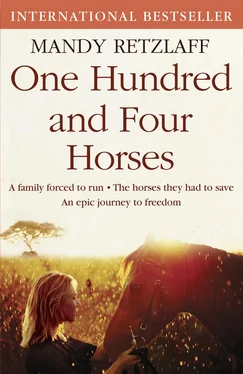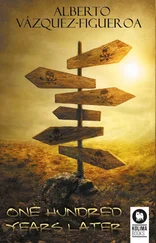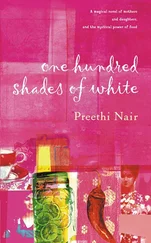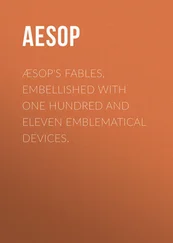We sat together, late at night.
“I want him to have the life I had,” Pat said, bouncing baby Paul on his knee. “I want the same sort of childhood for him. Somewhere he can ride with game, go wild in the bush, be surrounded by dogs and cattle and duiker and baboons. If he can have just ten years of a life like that, it has to be worth it, doesn’t it?”
I looked at the way Paul gazed up at his father. That, I decided, was the life I wanted for my children as well. If they could look back on their childhoods with as much vivid nostalgia as Pat did his own, we would have given them the best possible start.
“What do you think, Paul? Do you want to be a Zimbabwean?”
Paul looked at me, then at his father. Stoutly, he nodded.
“The master has spoken,” I said.
So Zimbabwean we were, and Zimbabwean we would stay.
It was those thoughts that returned to me as, ten years later, we unloaded our packs at Crofton to begin our new lives. As I watched Pat swing into the elderly Frisky’s saddle, and Kate and Jay tumble out of the barren house that would soon become our beloved home, I was thinking of the baby Paul, of those first days after Rhodesia became Zimbabwe, of the hopes and dreams Pat and I had shared long into the night. We had spent the last ten years living in various places across Zimbabwe—the agricultural research station where Pat first worked, the rugged farm Lonely Park, where Pat’s brother kept one of the nation’s biggest dairy herds—but the land around us was finally ours. It was a place we could mold, a place we could pour ourselves into and live until our lives were done. Ten years before, in one of our earliest homes, we had buried a baby, Nicholas, only a few weeks old when he died, and the feeling of leaving him behind was not one we wanted to live through again. Here, this new land on which we now stood, could be a place to put down roots, a place to live a good life and never leave anything behind again. It was scrubby, untamed, with low jagged hills crowned in bush and red earth that seemed impenetrable to the eye—but Pat brought Frisky around and, as he gazed into the distance, I knew already what he was thinking. Here, he would build barns; here, he would build workshops; here, the irrigation channels; here, the grading sheds for our tobacco. Behind him, Jay’s eyes were on the hills. He listened for the sound of baboons and searched the shadows between the trees for antelope or signs of leopard. Kate reached up and wrapped one arm around a lower bough of the mango tree. She was scrabbling to pull herself up when Paul appeared behind her and gave her the lift that she needed.
In front of me, Frisky snorted softly. She turned her head against Pat’s reins, as if all she wanted to do was look me in the eye. She too must have been considering the land. It dawned on me that this would be her final home, just as I wished it would be mine.
The land was ours. One day it would belong to our children, and our children’s children. Our new life had finally begun.
Chapter 2 Contents Cover Title Page One Hundred and Four Horses A family forced to run The horses they had to save An epic journey to freedom MANDY RETZLAFF Copyright William Collins An imprint of HarperCollins Publishers 77–85 Fulham Palace Road London W6 8JB www.harpercollins.co.uk First published in Great Britain by William Collins in 2013 Text © 104 Horses Ltd, 2013 The author asserts her moral right to be identified as the author of this work. Cover photographs (posed by a model) © Lara Wernet/NA/Novarc/Corbis (woman and horse); Panoramic Images/Getty Images (tree). A catalogue record for this book is available from the British Library. All rights reserved under International and Pan-American Copyright Conventions. By payment of the required fees, you have been granted the non-exclusive, non-transferable right to access and read the text of this ebook on-screen. No part of this text may be reproduced, transmitted, down-loaded, decompiled, reverse engineered, or stored in or introduced into any information storage and retrieval system, in any form or by any means, whether electronic or mechanical, now known or hereinafter invented, without the express written permission of HarperCollins. The author asserts the moral right to be identified as the author of this work. Find out more about HarperCollins and the environment at www.harpercollins.co.uk/green Source ISBN: 9780007477555 Ebook Edition © AUGUST 2013 ISBN: 9780007477579 Version: 2014-08-22 Dedication This book is dedicated to all our beautiful horses, and especially to those no longer with us— may their spirits run free . Epigraph Set a beggar on horseback, and he’ll outride the devil. —GERMAN PROVERB Prologue Ten Years Earlier Chapter 1 Chapter 2 Chapter 3 Chapter 4 Chapter 5 Chapter 6 Chapter 7 Chapter 8 Chapter 9 Chapter 10 Chapter 11 Mozambique Chapter 12 Chapter 13 Chapter 14 Chapter 15 Epilogue Picture Sections About the Publisher
OPENING UP THE bush to set up a farm is like riding a horse; you cannot command the land to do your bidding—you can only ask it. Like a horse, the land has its own character. It can be willful. It can be defiant. But it can give great joy as well, unveiling its secrets for you as you come closer and learn to work together for a greater good.
As we gazed out over virgin bush, Pat and I shared a daunted look. The land was rugged, scrubby lowlands out of which grew the wild, rocky hills we called koppies . Though the farm was bordered by two rivers, one a perennial stream and the other flowing north into the great Zambezi, the soil on which we meant to farm was fertile yet difficult to handle, being very hard and compacted, the kind of land that was impossible to cultivate without heavy machinery and careful management. The thought of driving back the bush and seeing fields of green tobacco, acres of tomatoes, and the rich glow of Mexican marigolds was enough to buoy us for the moment, but there was no use denying it: this was land into which only somebody as determined as Pat would dare to pour his life. There is no doubt that my husband is the most determined and optimistic man I have ever met. Were he not that way, our lives today would be very different.
The land we had bought had been a farm once before, during the Rhodesian tobacco boom of the early 1960s. For decades, though, no crops had been cultivated here; only cattle had roamed from river to river. In their fields, the mfuti trees with their long feathered leaves grew tall again, and the bush had crept down from the hillsides. For all its wildness, the farm was exactly what Pat had been dreaming of: a place where we might test ourselves like the first African pioneers, somewhere he could use all his years of study, a place we could shape and leave for our children.
All the history books had the same wisdom to share. It was not the pioneers who benefited from the years they did battle with the land; it was those who came after: their children.
“Where to begin?” I asked. Paul, Jay, and Kate gathered behind us.
“It begins,” said Pat, “with tomatoes.”
This land could not be tamed by Retzlaffs alone. In the days that followed, we hired more than 250 workers, who began to build their homes here, too. Never and his wife, Mai Never; our driver, Charles; our gardener, Oliver; and Kate’s nanny, Celia—only once we were all together could we begin. Farms in Zimbabwe often had whole villages of workers living on the land, with their own farm schools and medical clinics, and our farm was to be no different. We would have a core of workers who lived here, and, with the harvests, more would join us as seasonal contractors.
All over Crofton the rooms were dominated by big contour maps and plans Pat had drawn up: where best to build the grading sheds for some future crop of tobacco; how best the roads might run so that they were protected from natural erosion; how much of the land could be irrigated without resorting to building a dam. It was a broad, holistic approach to farming, a scheme Pat had been dreaming of since the first years of our marriage. To see it come to fruition was the culmination not only of a dream, but of decades of hard work.
Читать дальше












